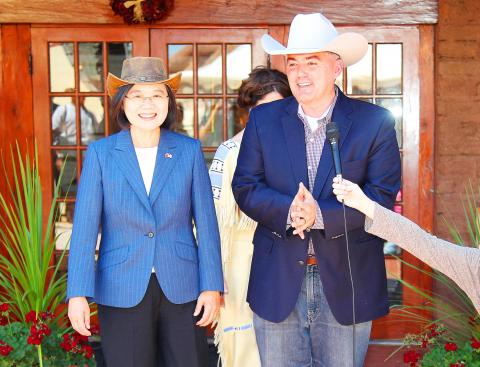Next year’s presidential election is a choice between value systems and ways of life, and the sustainability of democracy and freedom, President Tsai Ing-wen (蔡英文) said on Saturday.
After concluding a state visit to the nation’s four Caribbean allies on Friday, Tsai made a two-night stopover in Denver, Colorado, on her way home and held an informal meeting with reporters accompanying her delegation.
Commenting on foreign media reports that next year’s presidential and legislative elections would be a battle between pro-China and pro-US camps, Tsai said she sees the elections as “a choice between value systems and ways of life.”

Photo: CNA
Taiwan is a democratic society and its voters are focused on the nation’s future, especially whether its democratic way of life and freedom can be sustained, said Tsai, of the Democratic Progressive Party (DPP), who is running for re-election.
“We hope for peace and stability when handling cross-strait relations, we also hope that China will understand the hopes and priorities of Taiwanese that are expressed in each general election,” she added.
Asked about possible presidential challenges by the pro-independence Formosa Alliance or by Taipei Mayor Ko Wen-je (柯文哲), Tsai said that she aims to forge a coalition of supporters of Taiwan and the Republic of China.
The Formosa Alliance has organized itself into a political party, but has yet to nominate a presidential candidate. Ko has said he would announce next month whether he would run for president.
Regarding a running mate, Tsai said that the political situation is still developing and the DPP would hold a discussion later.
“Our objective remains to create the best and most competitive ticket for 2020,” she added.
During her trip to the Caribbean, interacting with local people and witnessing Taiwan’s assistance to its allies, such as helping Saint Lucia eradicate a disease that damaged banana crops, moved her, Tsai said.
American Institute in Taiwan Chairman James Moriarty also attended Tsai’s meeting with the press, and she thanked the US government for helping on her Caribbean trip.
Asked if she thought Taiwan would become a bargaining chip in US President Donald Trump’s re-election campaign next year or in US-China trade negotiations, Tsai said she would not comment on US domestic politics.
However, she believes Taiwan has the support of Americans and US political parties, she said.
Taiwan should have its own strategies and ideas based on its interests, and continue its cooperation and positive relations with the US, Tsai said.
Tsai on Saturday also visited the US National Center for Atmospheric Research in Boulder, Colorado.
She was welcomed by center director Everette Joseph, a group of Taiwanese scientists working at the facility and Taiwanese students in the area.
The center and Taiwanese scientists developed Formosat-7, the second satellite constellation jointly built by Taiwan and the US after Formosat-3.
She visited the Earth Observing Laboratory, one of the center’s seven laboratories, where she was given a tour of research aircraft.
Tsai later had lunch with US Senator Cory Gardner, who represents Colorado.
She is scheduled to arrive home today.

A Ministry of Foreign Affairs official yesterday said that a delegation that visited China for an APEC meeting did not receive any kind of treatment that downgraded Taiwan’s sovereignty. Department of International Organizations Director-General Jonathan Sun (孫儉元) said that he and a group of ministry officials visited Shenzhen, China, to attend the APEC Informal Senior Officials’ Meeting last month. The trip went “smoothly and safely” for all Taiwanese delegates, as the Chinese side arranged the trip in accordance with long-standing practices, Sun said at the ministry’s weekly briefing. The Taiwanese group did not encounter any political suppression, he said. Sun made the remarks when

The Taiwanese passport ranked 33rd in a global listing of passports by convenience this month, rising three places from last month’s ranking, but matching its position in January last year. The Henley Passport Index, an international ranking of passports by the number of designations its holder can travel to without a visa, showed that the Taiwan passport enables holders to travel to 139 countries and territories without a visa. Singapore’s passport was ranked the most powerful with visa-free access to 192 destinations out of 227, according to the index published on Tuesday by UK-based migration investment consultancy firm Henley and Partners. Japan’s and

BROAD AGREEMENT: The two are nearing a trade deal to reduce Taiwan’s tariff to 15% and a commitment for TSMC to build five more fabs, a ‘New York Times’ report said Taiwan and the US have reached a broad consensus on a trade deal, the Executive Yuan’s Office of Trade Negotiations said yesterday, after a report said that Washington is set to reduce Taiwan’s tariff rate to 15 percent. The New York Times on Monday reported that the two nations are nearing a trade deal to reduce Taiwan’s tariff rate to 15 percent and commit Taiwan Semiconductor Manufacturing Co (TSMC, 台積電) to building at least five more facilities in the US. “The agreement, which has been under negotiation for months, is being legally scrubbed and could be announced this month,” the paper said,

MIXED SOURCING: While Taiwan is expanding domestic production, it also sources munitions overseas, as some, like M855 rounds, are cheaper than locally made ones Taiwan and the US plan to jointly produce 155mm artillery shells, as the munition is in high demand due to the Ukraine-Russia war and should be useful in Taiwan’s self-defense, Armaments Bureau Director-General Lieutenant General Lin Wen-hsiang (林文祥) told lawmakers in Taipei yesterday. Lin was responding to questions about Taiwan’s partnership with allies in producing munitions at a meeting of the legislature’s Foreign Affairs and National Defense Committee. Given the intense demand for 155mm artillery shells in Ukraine’s defense against the Russian invasion, and in light of Taiwan’s own defensive needs, Taipei and Washington plan to jointly produce 155mm shells, said Lin,